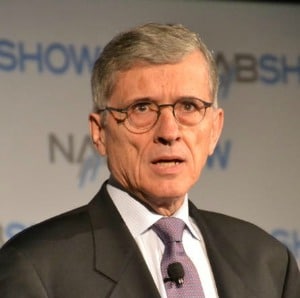
After calling it “a privilege” to chair the FCC for the last three years, outgoing FCC Chairman Tom Wheeler focused on digital issues in his farewell speech Friday at the Aspen Institute in Washington, DC.
In prepared remarks released by the FCC, Wheeler said, “We are living through an historic network revolution whose power to transform our economy and daily lives is unprecedented,” and called the FCC “the public’s representative” during that revolution.
After talking about FCC projects like the Connect America Fund to develop broadband in rural areas and the revamped Lifeline program that helps low-income Americans afford broadband and its role in protecting competition by opposing some mergers and approving others “with appropriate safeguards,” Wheeler moved on to the controversial “net neutrality” rules the FCC adopted during his tenure, saying they will “preserve the open Internet as a platform for free expression and innovation.”
Looking to the next administration, Wheeler said the FCC is at a “fork in the road,” urging the new commission to retain the rules rather than “re-litigating solutions that are demonstrably working.” He continued, “Looking forward is an era of ISPs operating responsibly at both the edge and the core network under light-touch regulation accompanied by a referee on the field to throw the flag when necessary. Looking backward takes away existing protections and throws into question ISP expansion into edge activities.”
Wheeler said that investment in Internet-specific business has risen 35 percent since the rules’ adoption and pointed to reports that the CEO of AT&T has told President-elect Trump that AT&T “had been the country’s leading investor of capital for each of the last five years. This, of course, includes the two years since adoption of the Open Internet rules.”
Wheeler went on, “The most compelling reason to keep moving forward on our current course with broadband policy is this: The open Internet is the law of the land. Tampering with the rules means taking away protections consumers and the online world enjoy today. What some describe as ‘free market economics’ cannot mean simply freeing incumbents of their responsibilities. A hands-off approach to network oversight is more than a shift in direction, it is a decision to remove rights and move backward.”
Defending the decision to place the Internet under Title II rules, central to the net neutrality rules, he said, “What is most interesting about this example is that the porting and interconnection problems that existed pre-rule have been eliminated without heavy-handed regulation. The mere fact that the FCC declared interconnection a Title II activity under the rules — but chose not to regulate — has produced an upswing in interconnection agreements and a downturn in interconnection pricing.”
Wheeler continued, “This is a significant development because it shows how the Open Internet order is successful simply by being watchful. There has been no ex ante rate regulation. The simple fact that the FCC was the referee on the field ready to act if necessary has meant the game has been played fairly.”
Republican FCC Commissioners Ajit Pai and Michael O’Rielly were outspoken opponents of the net neutrality decision; Pai, who is the senior Republican on the commission and may be its next Chairman, in a speech last month reiterated his earlier statement that the rules’ “days are numbered.”
Wheeler will be joining the Aspen Institute as a senior fellow after he leaves the FCC.








Just go away..Now!!!!